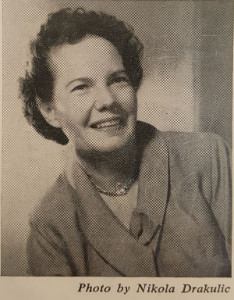Clarence Darrow: Defense Attorney

Author:
Iris Noble ![]()
![]() Complete Authored Works
Complete Authored Works
Publication:
1962 by Julian Messner, Inc.
Genre:
Biography, Non-fiction
Series:
Messner Shelf of Biographies (U.S. History)
Pages:
192
Current state:
This book has been evaluated and information added. It has not been read and content considerations may not be complete.
Book Guide
Search for this book used on:
As a defender of unpopular causes, Clarence Darrow fought in the courts for justice and mercy and established himself not only as this country's greatest trial lawyer but also as a great humanitarian and fighter for social progress.
Born in Ohio, Darrow was a schoolteacher at sixteen, a lawyer at twenty-one. But he was dissatisfied with his comfortable country practice, and his mind was torn with questions. Should a lawyer prosecute people who were hopelessly driven to crime? Was it their fault that poverty and slums bred deformed minds? He brought his family to Chicago, hoping to find the answers there, but no one wanted his services. Gradually his luck changed. He worked in various positions for the city of Chicago, and then he became attorney for a railroad. But his compassion for the underdog and his approval of a worker's strike against the railroad lost him his job. Once again conscience had triumphed over comfort.
He battled for the freedom of labor leader Eugene V. Debs, head of the American Railway Union, who was charged with conspiracy against the government. And as an aftermath of his defense of the McNamara brothers in Los Angeles, Darrow himself was arrested on charges of conspiracy to bribe a juror, but he was cleared. He went on to defend murderers Leopold and Loeb. And his legal duel with Williams Jennings Bryan at the Scopes anti-evolution trial rocked the nation, for it was more than a courtroom battle, it was a conflict between freedom of thought and superstitious bigotry.
This is the magnificent story of a man lashed by his own principles—passionately dedicated to justice, yet who often despised the cold processes of law. Darrow was labeled a devil, an atheist, a radical; he was also called Christ-like. His credo is epitomized in his own words: "I speak for the poor, for the weak, for the weary, who in darkness and despair have borne the labors of the human race . . . "
From the dust jacket
To view an example page please sign in.
Content Guide
Please sign in to access all of the topics associated with this book and view other books with the same topics.
Please sign in to access the locations this book takes place in and view other books in the same location.
Please sign in to access the time periods this book takes place in and view other books in the same time period.
For information about the lead characters please sign in.
Find This Book
Search for this book used on:


